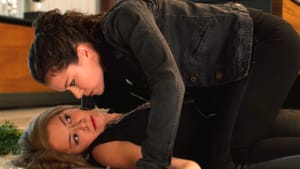Stay in the Loop
BSR publishes on a weekly schedule, with an email newsletter every Wednesday and Thursday morning. There’s no paywall, and subscribing is always free.
Editor's choice
2014 highlights: An idiosyncratic list

The upside of editing Broad Street Review is that I get to live vicariously through our dozens of writers as I edit and post their reviews and essays — like you, I rely on them to provide the scoop on performances I missed and knowledgeable recommendations on things to read, watch, and listen to.
The downside is that I’m so busy living vicariously through our dozens of writers that I don’t always make time to share my own experiences and meditations about them. Here are some of the essays I didn’t write in 2014, presented as a "best of" list of recommendations, not actual analyses.
1. Best actor, any medium: Tatiana Maslany in Orphan Black. I’ve made no secret of my tendency to binge-watch TV shows, and though the second season of Orange Is the New Black still gets my vote for best show of 2014, Orphan Black is a close runner-up. This is due in large part to Maslany’s mind-blowingly virtuosic performance as a group of clones who discover one another’s existence and have to figure out where they came from and why someone — or several someones? — are trying to kill them. The main four clones (we meet a dozen or so over the first two seasons) are grifter Sarah, the show’s protagonist; bisexual Cosima, an evolutionary biology grad student who is central to figuring out the science behind what’s going on; uptight soccer mom Alison, who provides any weapons the group needs; and Helena, a fanatic intent on killing all the others.
Maslany has help from costumes, hair, and makeup, but the clones are distinct because she imbues each with its own personality. For instance, she is able, in one episode, to portray Sarah impersonating Alison in a way that makes it clear that it’s Sarah impersonating Alison, not just the actress defaulting to Alison’s mannerisms. (By the way, our Paula Berman is also a fan: She mentions the show in her piece on female antiheroes.)
2. Best movie based on a true story: Foxcatcher. “How come they didn’t show the two-day standoff before du Pont was arrested?” a usually savvy friend asked on Facebook: “They left out all the good stuff.” Well, they left out the melodramatic stuff, but they left in the creeping menace of the unfolding relationship between John du Pont (Steve Carell) and Mark Schultz (Channing Tatum), two men with nothing in common but a love of wrestling and the utter inability to articulate their interior lives. It’s about the characters, not the weaponry. (You can read Ilene Raymond Rush's review here.)
3. Best movie not based on a true story: Birdman.  Yes, it’s presented as though the whole thing is a single, continuous two-hour take, but that’s not a gimmick — it serves to make the camera another character, or maybe just to take you into the characters’ claustrophobic world. And yes, there are some implausible situations, but if you regard the story as a form of magical realism, that objection also disappears. (Update: A month later, I finally got around to reviewing it, with, it turns out, a completely different take but no less enthusiasm. My review is here; you can read Victor Schermer's review here.)
Yes, it’s presented as though the whole thing is a single, continuous two-hour take, but that’s not a gimmick — it serves to make the camera another character, or maybe just to take you into the characters’ claustrophobic world. And yes, there are some implausible situations, but if you regard the story as a form of magical realism, that objection also disappears. (Update: A month later, I finally got around to reviewing it, with, it turns out, a completely different take but no less enthusiasm. My review is here; you can read Victor Schermer's review here.)
4. Most successful rereading experience: the works of Sheri S. Tepper. She often deals with religion, environmentalism, gender roles, and other themes and topics of interest to me, and though I read very little science fiction anymore, I still pick up each new Tepper title as it appears. This year I read her Waters Rising, set, according to the cover copy, in the same world as A Plague of Angels, which I had an obviously read copy of and no recollection whatsoever of having read it. After rereading that, I undertook rereading the rest of her oeuvre, blessing the quirk of my otherwise excellent memory that prevents me from remembering anything about a book but whether I liked it or not. I’m delighted to report that most of her books hold up well.
Never read her? Most people haven’t. I’d start with The Family Tree (only $0.99 on Kindle!), which simultaneously tells two stories, one set in our world, where nature is running amok, and one on some other world, where a group of characters are on a quest. Yes, the tales combine, but in ways I guarantee you won’t have predicted.
5. Least successful rereading experience: Remembrance of Things Past. I read this back in my early 20s, when I had plenty of time for such projects, but remembered nothing of it (see above). I spent most of the fall moving steadily through the first three volumes of the epic.
read this back in my early 20s, when I had plenty of time for such projects, but remembered nothing of it (see above). I spent most of the fall moving steadily through the first three volumes of the epic.
Reading Proust requires giving up your breakneck 21st-century reading speed and going at the pace he sets, and for almost 1,000 pages I enjoyed doing so. Then he spent a couple hundred pages describing one single party he went to, attended by people I found infinitely less interesting than he did. That proved to be the breaking point. Au revoir, Marcel.
6. Book with the widest gap between my expectations going in and my actual enjoyment: Inventing Wonderland by Jackie Wullschlager. My sister loaned it to me because I’d enjoyed (well, if “enjoyed” is the right word for a book about a seriously creepy human being) Piers Dudgeon’s Neverland: J. M. Barrie, the Du Mauriers, and the Dark Side of Peter Pan.
I wasn’t expecting too much from the Wullschlager, since literary criticism is usually pretty dry, but I became engrossed in her examination of how the lives and work of five important authors — all, not coincidentally, British — reflected the moods of their respective eras, from Lewis Carroll’s and Edward Lear’s pre-Freudian Victorian innocence through Kenneth Grahame’s and J.M. Barrie’s adventurous boys of the Edwardian era, to the disillusioned self-awareness of A.A. Milne after World War I. She also addresses the men’s psycho-sexual preoccupations, without getting too salacious about it.
Photo from Birdman © 2014 - Fox Searchlight
Sign up for our newsletter
All of the week's new articles, all in one place. Sign up for the free weekly BSR newsletters, and don't miss a conversation.

 Judy Weightman
Judy Weightman